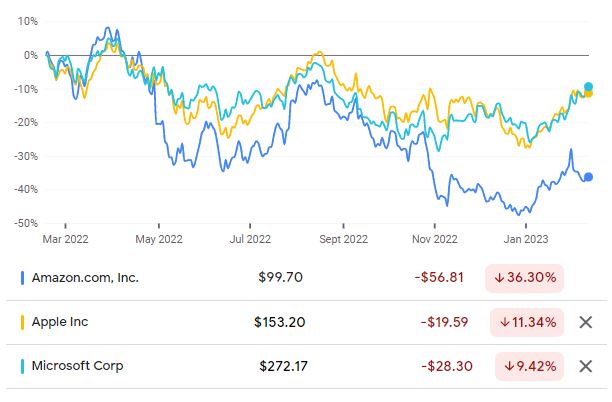The FTSE 100 index breached the 8,000 mark for the first time, exceeding the hurdle on Wednesday afternoon. It floated near the milestone for days, before breaking at around 3.30pm. By the close of play, the market stod at 7,997.
It has been eight years since it passed the 7,000 mark, which translates into a compound capital return of 1.7% a year, according to Laith Khalaf, head of investment analysis at AJ Bell.
Having already broken several records in January, the FTSE 100 has continued its march higher in February, with the UK’s main index of large-cap companies up 6.6% since the start of the year (to yesterday’s close).
This follows on from a strong year in 2022, when the market made a 0.9% gain while most other major developed markets fell as investors backed the UK market thanks to its composition of old-economy sectors such as oil and gas, mining and financials
Total return of the FTSE 100 index since the start of 2022
-2.png)
Source: Google Finance
These companies were ignored during the decade-long technology bull run of the 2010s, but have come back into focus over the past year as inflation and higher interest rates, as well as supply side issues, have caused value stocks to surge.
Indeed, three of the index’s largest companies – healthcare firm AstraZeneca and oil giant Shell and banking group HSBC – are collectively worth £478.2bn and their share prices climbed 36%, 63.7% and 41.6% respectively over the past year.
Total return of Shell, HSBC and AstraZeneca since the start of 2022
-2.png)
Source: Google Finance
Khalaf pointed out that the success of the FTSE 100 can be tracked back to the invasion of Ukraine, which was the catalyst for soaring inflation and interest rates.
He said: "This helped buoy the share prices of the oil and gas sector, and the financial sector too, as the fight against increased inflation has meant interest rates have also had to rise, boosting bank reserves. A weak pound has also helped propel the Footsie upwards, thanks to all the overseas earnings made by the companies within it."
Alexander Campbell, head of communications at Freetrade, said continued volatility in global markets could keep UK assets in style for years to come.
“If we continue to see bottlenecks and demand rise in basic goods and materials, we could continue to see these old economy giants dominate well into the twenty-first century,” he said.
Now that the index has surpassed 8,000, the new high is sure to excite investors, even if the statistic is somewhat meaningless.
Chris Beauchamp, chief market analyst at IG, said one aspect that has been particularly interesting over the past year has been the domestic market’s outperformance versus the US.
Big technology companies in the US led the global economy post-financial crisis but markets dropped these in favour of the UK old economy names in 2022.
Beauchamp said: “It is a sign of how markets and investors have shifted from an obsession with tech to indices that have almost no tech/growth stocks in them.”
Indeed, the S&P 500 index is down 7.5% over the past 12 months, while the FTSE 100 has climbed 4.7% over the same period.
Similarly, the US index’s biggest players are struggling whilst the UK’s leaders have thrived. Apple, Microsoft and Amazon dropped 11.3%, 9.4% and 36.3% over the past year respectively.
Share price of Amazon, Apple and Microsoft over the past year
Source: Google Finance
It is a rare occurrence for these US giants to underperform UK companies, but high inflation and rising interest rates around the globe create a positive case for the FTSE 100 index, according to Beauchamp.
He said: “While tough times still probably lie ahead, it is quite something to see non-US markets doing so well and is undoubtedly welcome news for all those UK workers and pensioners whose pots are certainly heavily-invested in the FTSE 100.”
Khalaf agreed that those in, or approaching, retirement will be pleased by today's news as the index often makes up a large portion of pension funds.
He said: "The 8,000 level is a purely psychological milestone, but investors in the UK stock market will nonetheless be happily counting their coffers after a year in which it has been one of the best performing major markets.
"Pension and ISA valuations will be looking pretty healthy thanks to the performance of the FTSE 100 and indeed the continued resurgence in the US stock market since the turn of the year."






